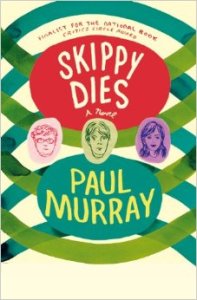
Murray, Paul. Skippy Dies. London: Penguin, 2010. Print.
Genre: literary fiction (for adults) (I argue: YA contemporary)
Summary: Howard (the coward) returns to teach at his alma mater, Seabrook College. Howard never achieved the fame and fortune that is expected of Seabrook graduates. Instead, he muddles through his life and relationships burdened with the secrets that would surely tarnish Seabrook’s reputation if they ever came to light. Before the school year is out, Howard is snagged into yet another school tragedy when the boy everyone calls “Skippy” mysteriously dies.
Critique: This book was not marketed as a cross-over that adults and young adults might enjoy, and I think that was a mistake. I lived in Ireland when this book came out. I saw teens gorging on the 600+ pages. I saw them swarm the author at readings around Dublin as if he were the new Rowling or Meyers!
The text plays (timidly) with fonts to indicate cell phone ring tones, hit songs, and other quirks of digitized teenage life. The point of view cunningly shifts from close third to second person whenever characters slip from sober to high. And Murray’s humor mingles the wry, dark, and tragic. Don’t be surprised if you laugh in the midst of bitter tears.
This book was short- and long-listed for nearly every UK book award, including the Mann Booker. And it’s no surprise why: rather than pooh-pooh the trials of teenage life and love, this book employs string theory, Irish folklore, and the complex mathematics to capture this devastatingly explosive time in all our lives. Suddenly, blazingly, staggeringly, readers realize the human heart is a complicated realm, regardless of your age! Where Murray might have been timid with fonts, he is unreservedly bold with contemporary issues like bullying, sexual molestation, and drug abuse.
Indeed, this book is not for the timid. No. It is for the brave parents, teens, and other readers who acknowledge life is not a safe haven, but a savage garden of good and evil, tragic and jolly. Those who enjoy John Green and A. S. King will adore Skippy Dies.
Comments